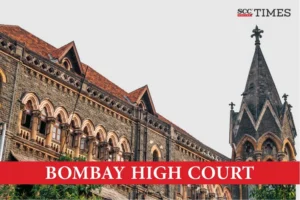Bombay High Court: The instant petition was brought before the Court by a vehicle-trading enterprise (“petitioner”), that sought refund of excess tax paid for the financial year (“FY”) 2011-2012, amounting to Rs. 10,69,89,606 with interest thereon, under the provisions of the Maharashtra Settlement of Arrears of Tax, Interest, Penalty or Late Fee Act, 2019 (“Settlement Scheme”). The Division Bench of K.R. Shriram and Jitendra Jain*, JJ., noted that the Tax authorities had collected tax in excess of the requisite amount, and therefore, opined that such retention was violative of the Constitution. The Court found that the defect notice that was issued to petitioner was also defective. Hence, the Tax authorities were directed by the Court to refund the excess amount of tax collected, to the petitioner’s bank account.
Background
The petitioner is engaged in trading of vehicles and is registered with respondent 1. The instant petition was brought before the Court seeking refund of tax paid for the financial year (“FY”) 2011-2012, amounting to Rs. 10,69,89,606, with further interest thereon.
For the FY 2010-2011, an assessment order was passed by respondent 1, demanding a sum of Rs. 17,76,93,422, that was challenged in an appeal. The Appellate Authority passed an order by which the demand was reduced to Rs. 14,00,74,890.
For the FY 2011-2012, another assessment order was passed demanding a sum of Rs. 9,67,02,366. The said order was appealed against, and a refund of Rs. 10,69,89,606 was allowed.
In March 2019, respondent 3 issued an ordinance for the settlement of arrears of tax, interest, penalty and late fee outstanding on 01-04-2019, that became the Settlement Scheme.
The petitioner informed the respondents in April 2019 that they were considering availing the benefit under the Settlement Scheme for the FY 2010-2011 and informed the respondents to not adjust the refund of Rs. 10,69,89,606. The petitioner further informed the respondents on 13-05-2019 that they had paid Rs. 8,46,84,821 as per the Settlement Scheme against the original outstanding amount of 14,00,74,890.
The respondents issued a defect notice on 14-05-2019 under Section 11 of the Settlement scheme, informing the petitioner that the requisite amount payable amount for the FY 2010-2011 was Rs. 66,17,057, after adjusting the refund of Rs.10,69,89,606 for the year 2011-2012. On 23-05-2019, the respondents issued a refund adjustment order under Rule 55 of the Maharashtra Value Added Tax Rules, 2005, informing the petitioner that the refund of Rs. 10,69,89,606 for the year 2011-2012 would be adjusted towards the tax amount due for the FY 2010-2011.
The petitioner challenged the said defect notice and refund adjustment before the instant Court in Writ Petition No. 8343 of 2019. The said petition was disposed of in 2023, and the matter was remanded to the respondents to consider the petitioner’s refund application. The respondents rejected the refund application on the ground that the refund was adjusted against the payable amount in FY 2010-2011. Therefore, the instant petition was filed before the Court, praying for the refund of Rs. 10,69,89,606.
Court’s Analysis and Decision
It was undisputed before the Court that the petitioner was liable to pay Rs. 8,46,84,821 for the FY 2010-2011, and that it was paid by the petitioner as per the Settlement Scheme in May 2019, and that there was no outstanding due for FY 2010-2011 on the date of the said payment. Therefore, since there was no due for the FY 2010-2011, the respondents could not have adjusted the refund for the FY 2011-2012 against it. It was also undisputed that the petitioner’s liability under the Settlement Scheme for FY 2010-2011 was 8,46,84,821, whereas the respondents had recovered a total of Rs. 19,16,74,501. Hence, such refund adjustment was illegal, and the petitioner was entitled to the refund of Rs. 10,69,89,606.
The Court stated that State authorities cannot retain the excess amount which is not in accordance with law and the same would be violative of Article 265 of the Constitution.
The Court noted that the defect notice issued under Section 11 recorded the difference between the outstanding amount for FY 2010-2011 and the refund adjustment amount for FY 2011-2012, as the outstanding amount. The Court stated that it failed to understand as to how was the defect notice issued on 14-05-2019, that had arrived at the outstanding amount of Rs. 3,30,85,284, after adjusting the refund amount, when the refund adjustment order itself was issued on 23-05-2019. Therefore, the Court stated that the defect notice was itself defective.
Perusing Section 11 of the Settlement scheme, the Court found that a defect notice is issued when there is a shortfall in making the payment, and not when an applicant has paid the correct amount. Therefore, in the instant case, when the requisite amount was Rs. 66,17,057, the petitioner had paid Rs. 8,46,84,821, which was in excess of the requisite amount. Hence, the Court found that the defect notice was contrary to Section 11 as well.
In light of the above, the Court directed that the refund of Rs. 10,69,89,606 shall be paid to the petitioner, along with an interest at 6% per annum from 01-06-2019 till date. The Court directed the petitioner to furnish their bank account details to the respondents within two weeks, and the respondents were directed to transfer the amount to the said account, summed with an interest, within four weeks from the date of furnishing of the bank details.
[TML Business Services Ltd. v. CST, 2024 SCC OnLine Bom 2177, decided on 09-07-2024]
*Judgment authored by: Justice Jitendra Jain
Advocates who appeared in this case :
For the petitioner: Rafiq A. Dada, Senior Advocate; Z.R. Dada, H.N. Vakil and Samkit Shah, Advocates, i/by Mulla & Mulla & Craigie Blunt & Caroe
For the respondents: S.D. Vyas, Additional Government Pleader; P.N. Diwan, AGP, and S.L. Babar, AGP

